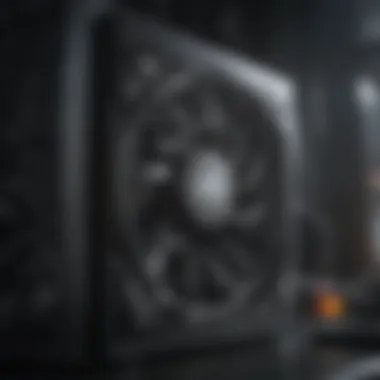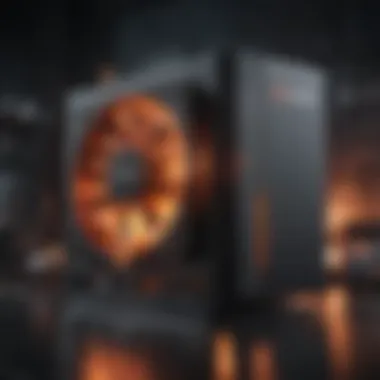Unleashing the Power: Essential Components for Crafting a High-Performance Gaming PC


News Updates
In the fast-paced world of gaming and technology, staying updated on the latest news, releases, and events is crucial for enthusiasts and builders alike. Whether it's the announcement of new hardware advancements, upcoming game launches, or industry conventions, being in the know can greatly impact your PC building experience. Stay tuned to this section for all the breaking news in the gaming, entertainment, TV & Movies, esports, and tech industries.
Processor
The processor, also known as the CPU, is the brain of your gaming PC. It processes all the instructions and calculations necessary for running games smoothly. When selecting a processor, factors like core count, clock speed, and cache memory play a significant role in determining its performance. Whether you opt for an AMD Ryzen or an Intel Core series processor, make sure to choose one that aligns with your gaming preferences and budget.
Dominate the virtual realm with a powerful processor that can handle the most demanding games and tasks with ease.
Graphics Card
A superior graphics card is essential for rendering lifelike visuals and immersive gameplay. Graphics processing units (GPUs) from NVIDIA and AMD deliver cutting-edge technologies like ray tracing and AI-enhanced graphics, taking your gaming experience to the next level. Consider factors such as VRAM size, clock speed, and cooling solutions when selecting a graphics card to ensure stable frame rates and stunning visuals.
Immerse yourself in stunning landscapes and realistic environments with a high-performance graphics card that brings games to life.
Motherboard
Think of the motherboard as the foundation that connects all your components together. It houses essential interfaces like CPU sockets, RAM slots, and expansion slots for additional cards. When choosing a motherboard, factors like form factor, chipset compatibility, and connectivity options should be taken into account. A reliable motherboard not only supports your current components but also accommodates future upgrades and enhancements.
Build your gaming empire on a sturdy motherboard that provides stability, performance, and room for expansion.
Memory (RAM)
Random Access Memory (RAM) is vital for smooth multitasking and optimal gaming performance. The amount of RAM you choose should align with the games you play and the multitasking demands you have. Consider factors like speed, capacity, and latency when selecting RAM modules, ensuring compatibility with your motherboard and processor. With ample RAM, you can seamlessly switch between applications and enjoy lag-free gaming sessions.
Elevate your gaming experience with lightning-fast RAM that keeps up with your intense gaming sessions and demanding applications.
Storage
Storage drives are where all your games, files, and operating system reside. Solid State Drives (SSDs) and Hard Disk Drives (HDDs) are commonly used for storage in gaming PCs. SSDs offer faster load times and data transfer speeds, ideal for storing your frequently played games and operating system. HDDs, on the other hand, provide higher storage capacities at a lower cost per gigabyte, making them suitable for mass storage.
Harness the power of fast storage solutions to minimize load times and maximize your gaming efficiency and productivity.
Power Supply
The power supply unit (PSU) delivers electricity to all components of your gaming PC. When selecting a PSU, factors like wattage, efficiency ratings, and modular cabling should be considered. A reliable and efficient PSU ensures stable power delivery, protects your components from power surges, and contributes to the overall longevity of your system.
Power up your gaming rig with a high-quality PSU that provides consistent and clean power for uninterrupted gaming sessions.
Cooling System
Effective cooling is essential to prevent overheating and ensure optimal performance of your gaming PC. Air coolers and liquid cooling solutions are popular options for keeping your processor and graphics card temperatures in check. Factors like heat dissipation capacity, noise levels, and space constraints should be considered when choosing a cooling system that fits your build and budget.
Keep your gaming rig cool and quiet with a reliable cooling solution that maintains optimal temperatures during intense gaming sessions.
Case
The computer case houses and protects all your components while also contributing to the aesthetics of your gaming setup. Factors like form factor compatibility, airflow design, and cable management features should be taken into consideration when selecting a PC case. Choose a case that not only fits your components comfortably but also reflects your style and gaming preferences.
Showcase your gaming hardware in a stylish and functional case that offers ample space, airflow, and customization options for your ultimate gaming setup.


Peripherals
Peripherals like monitors, keyboards, mice, and headsets are essential accessories that complement your gaming experience. When choosing peripherals, factors like display resolution, switch type, sensor technology, and audio quality should be considered to enhance your gaming performance and comfort. Select peripherals that cater to your preferences and playing style, ensuring an immersive and enjoyable gaming experience.
Gear up with high-quality peripherals that provide comfort, precision, and immersive audiovisual experiences for all your gaming adventures.
Operating System
The operating system is the software platform that manages all your hardware components and software applications. Choosing the right operating system, whether it's Windows, mac OS, or Linux, is crucial for compatibility with your games and productivity tools. Ensure your operating system is up to date and optimized for gaming performance, security, and stability to unleash the full potential of your gaming PC.
Optimize your gaming environment with a reliable operating system that provides seamless performance, compatibility, and customization options for all your gaming and multitasking needs.
Embrace the world of PC gaming with a meticulously curated selection of essential components that form the foundation of your ultimate gaming rig. From powerhouse processors to immersive peripherals, each component plays a vital role in delivering unparalleled gaming experiences. Dive deep into the realm of PC building, select your components wisely, and embark on an epic gaming journey filled with speed, power, and thrill!
Central Processing Unit (CPU)
The CPU is a fundamental component in any gaming PC setup, responsible for executing instructions, performing calculations, and ensuring the smooth running of software. When it comes to gaming, the processor speed and number of cores are critical factors to consider. A higher processor speed allows for faster task execution, while multiple cores enable the CPU to handle multiple processes simultaneously. By choosing the right CPU for gaming performance, enthusiasts can experience faster loading times, smoother gameplay, and improved responsiveness.
Processor Speed and Cores
Choosing the right CPU for gaming performance
When selecting a processor for gaming, individuals should focus on factors such as clock speed, core count, and power efficiency. A CPU with a higher clock speed ensures quick data processing, essential for running demanding games and applications. Additionally, a higher core count enables the CPU to handle complex gaming tasks efficiently. Processors like AMD's Ryzen series or Intel's Core i7 offer a balance of speed and cores, making them popular choices in the gaming community. The unique feature of choosing the right CPU lies in the ability to customize performance levels based on individual gaming needs.
Cooling Solutions
Maintaining optimal temperatures is crucial for the longevity and performance of a CPU. Two common cooling solutions for CPUs are air cooling and liquid cooling. While air coolers are budget-friendly and easy to install, liquid cooling systems provide superior heat dissipation, ideal for overclocked CPUs or high-performance gaming rigs. Their main advantage lies in their ability to reduce temperature spikes and maintain stable performance under heavy workloads.
Air cooling vs. liquid cooling
When comparing air cooling to liquid cooling, individuals must consider factors such as cooling efficiency, noise levels, and system aesthetics. Air coolers are known for their simplicity and reliability, offering adequate cooling for standard gaming setups. Conversely, liquid coolers excel in managing heat dissipation, ensuring lower temperatures during prolonged gaming sessions. The unique feature of liquid cooling is its capacity to maintain consistent CPU temperatures, enhancing overall system stability.
Socket Compatibility
Ensuring the CPU fits the motherboard socket is essential for proper functionality and performance. Compatibility issues can lead to system errors, reduced processing speeds, and potential hardware damage. By selecting a CPU that aligns with the motherboard socket type and size, users can prevent connectivity issues and maximize the CPU's capabilities. The unique feature of socket compatibility lies in its impact on system reliability and stability, offering users seamless integration of CPU and motherboard components for optimized gaming experiences.
Graphics Processing Unit (GPU)
In this extensive guide focusing on the essential components necessary to construct a cutting-edge gaming PC, the Graphics Processing Unit (GPU) emerges as a pivotal element driving impeccable gaming performance. The GPU, often referred to as the heart of a gaming rig, is responsible for rendering complex graphics and ensuring smooth gameplay. Its significance in delivering high frame rates, stunning visuals, and fast processing cannot be overstated.
GPU Architecture and VRAM
Understanding GPU memory and performance
When delving into the intricacies of GPU architecture and VRAM, it becomes evident that the memory configuration and performance capabilities heavily impact overall gaming experience. GPUs with higher VRAM capacities exhibit enhanced multitasking abilities and excel in handling resource-intensive tasks such as high-resolution gaming and content creation. The ability of VRAM to store and retrieve data swiftly contributes significantly to seamless gameplay and immersive visuals.
Connectivity and Outputs
Ports and interfaces for display connectivity
The realm of connectivity and outputs plays a crucial role in determining the versatility and compatibility of a GPU within a gaming setup. Varied ports and interfaces equip users with the flexibility to connect multiple displays, VR headsets, and external peripherals seamlessly. The presence of diverse connectivity options ensures that gamers can tailor their setup to meet specific requirements, whether it involves immersive gaming environments or multitasking across multiple screens for enhanced productivity.


Overclocking and Cooling
Optimizing GPU performance through overclocking
In the pursuit of maximizing GPU performance, overclocking stands out as a viable strategy for extracting additional power from the graphics card. Through overclocking, users can push the GPU beyond its factory-set limits, thereby enhancing frame rates and overall gaming experience. While overclocking presents an opportunity for increased performance, it is crucial to maintain efficient cooling to mitigate any potential risks of hardware damage or instability. The balance between overclocking and cooling is crucial for achieving optimal performance without compromising system integrity.
Random Access Memory (RAM)
Random Access Memory (RAM) is a vital component in constructing a high-performance gaming PC. Its primary role is to provide fast access to data that the CPU requires to operate efficiently during gaming sessions. Choosing the right RAM involves considering aspects such as speed and capacity. Faster RAM speeds result in quicker data transfers, enhancing overall system performance. Additionally, sufficient RAM capacity ensures smooth multitasking and prevents bottlenecking.
Memory Speed and Capacity
When determining the appropriate amount of RAM for gaming, factors like the game's requirements, operating system demands, and multitasking needs must be considered. Optimal memory speed significantly impacts gaming performance by reducing loading times and improving frame rates. High-memory capacity allows for running resource-intensive games seamlessly and enhances overall system responsiveness.
Memory Channels and Latency
The impact of memory speed on gaming performance cannot be overstated. A higher memory speed ensures quick data access, reducing lag and enhancing gaming experiences. Memory latency, on the other hand, affects how swiftly the memory can respond to operations, influencing overall system performance. Balancing memory speed and latency is crucial to maximizing gaming efficiency and achieving optimal gameplay.
Storage Solutions
In the realm of building a gaming PC, the significance of Storage Solutions cannot be overstated. Among the core components required for a high-performance rig, the choice of storage devices impacts not only the speed and efficiency of data retrieval but also the overall user experience. Storage Solutions encompass both Solid State Drives (SSDs) and Hard Disk Drives (HDDs), each offering unique benefits and considerations that cater to varying needs of gamers.
Solid State Drives (SSD)
Benefits of SSDs in gaming PCs
Delving into the realm of Solid State Drives (SSDs) brings forth a key aspect essential for optimizing gaming performance. The Benefits of SSDs in gaming PCs lie in their unparalleled speed and responsiveness. Unlike traditional HDDs, SSDs operate without moving parts, leading to significantly faster data access and load times. This characteristic not only enhances the gaming experience by reducing lag but also accelerates system boot-up and application launch times. SSDs are a popular choice for gaming enthusiasts due to their reliability, durability, and silent operation. Their ability to withstand shocks and vibrations makes them ideal for gamers seeking a seamless and uninterrupted gameplay experience.
Hard Disk Drives (HDD)
Utilizing HDDs for mass storage
Contrasting the agility of SSDs, Hard Disk Drives (HDDs) excel in offering ample storage capacity for mass data storage. The key characteristic of Utilizing HDDs for mass storage lies in their cost-effectiveness and high storage volumes. While HDDs may fall short in speed compared to SSDs, they remain a beneficial choice for gamers requiring extensive storage space for game libraries, downloads, and multimedia content. One unique feature of HDDs is their cost-efficiency per gigabyte, making them a practical option for budget-conscious gamers or those with vast storage requirements. However, their mechanical nature and slower readwrite speeds can lead to longer loading times and slightly reduced system responsiveness when compared to SSDs, which is a trade-off for storage capacity.
Motherboard Selection
When embarking on the journey of building a gaming PC, one of the most critical decisions you'll make is selecting the motherboard. The motherboard serves as the foundation for all your other components, interconnecting them to ensure smooth operation. The chosen motherboard dictates what CPU, GPU, RAM, and storage options you can use, impacting the overall performance and capabilities of your system. It is essential to consider factors such as form factor, chipset compatibility, expansion slots, and BIOS support when choosing a motherboard for your gaming setup. Opting for a high-quality motherboard tailored to your specific needs can significantly enhance your gaming experience.
Form Factor and Chipset
Choosing the right motherboard size and features
Selecting the appropriate form factor and chipset for your motherboard is crucial in optimizing your gaming PC's functionality. The form factor determines the physical dimensions and layout of the motherboard, influencing the size of your PC build and the number of components it can accommodate. Common form factors include ATX, Micro-ATX, and Mini-ITX, each offering varying sizes and features. ATX motherboards provide extensive connectivity options and ample expansion slots, making them ideal for high-performance gaming rigs. Micro-ATX boards, on the other hand, offer a more compact design while still supporting multiple components. Mini-ITX motherboards are the smallest, ideal for compact builds but with fewer expansion slots.
Expansion Slots and Ports
Compatibility with other PC components is crucial for seamless integration and optimal performance. Expansion slots and ports on the motherboard determine what additional hardware you can install, such as graphics cards, sound cards, and storage devices. When selecting a motherboard, ensuring compatibility with your existing or planned components is essential to avoid bottlenecks or connectivity issues. Assessing the number and types of expansion slots available, such as PCIe, M.2, and SATA, will help determine if the motherboard meets your future upgrade requirements and system connectivity needs.
BIOS and UEFI
Understanding motherboard firmware, including BIOS (Basic InputOutput System) and UEFI (Unified Extensible Firmware Interface), is vital for customizing and optimizing your gaming PC. The BIOSUEFI controls hardware initialization, system settings, and boot processes, influencing system stability and performance. Newer motherboards often come with UEFI firmware, offering more advanced features and a user-friendly interface compared to traditional BIOS. Familiarizing yourself with BIOSUEFI settings can help in overclocking, adjusting fan curves, and troubleshooting system issues effectively, enhancing your gaming rig's overall efficiency and performance.


Power Supply Unit (PSU)
In the realm of building a gaming PC, few components are as crucial as the Power Supply Unit (PSU). The PSU acts as the backbone of the system, providing the necessary electrical power to all other components. It is responsible for stable and efficient power delivery, ensuring the smooth operation of the entire rig. Selecting the right PSU is paramount for the overall performance and longevity of the system.
Wattage and Efficiency
Selecting the right PSU for gaming power demands
When it comes to gaming power demands, selecting the right PSU with the appropriate wattage is essential. The wattage of a PSU determines its capacity to supply power to the components under heavy loads, such as during intense gaming sessions. Choosing a PSU with adequate wattage ensures that all components receive sufficient power, preventing issues like system crashes or instability.
The key characteristic of selecting the right PSU for gaming power demands lies in understanding the power requirements of the entire system. It involves calculating the power consumption of the CPU, GPU, RAM, storage drives, and other peripherals to determine the total wattage needed. Opting for a PSU with a wattage slightly higher than the calculated value offers a buffer for upgrades or additional components in the future.
One of the benefits of choosing the right PSU for gaming power demands is improved system stability and efficiency. By providing the necessary power without straining the PSU, components can operate optimally, enhancing gaming performance and reducing the risk of hardware damage due to inadequate power supply.
Modularity and Cable Management
Organizing cables for improved airflow and aesthetics
Modularity and cable management are crucial aspects when it comes to optimizing airflow and enhancing the visual appeal of a gaming PC build. Modular PSUs allow users to attach only the cables they need, reducing clutter inside the case and improving airflow. Proper cable management not only promotes better cooling efficiency but also facilitates easier maintenance and upgrades in the future.
The key characteristic of organizing cables for improved airflow and aesthetics lies in achieving a clean and organized layout within the PC case. Tying cables neatly, routing them along designated cable management channels, and securing them away from major heat sources contribute to optimal airflow, preventing potential heat build-up that could affect system performance.
One of the advantages of organizing cables for improved airflow and aesthetics is the enhancement of overall system aesthetics. Well-managed cables not only improve airflow efficiency but also create a visually pleasing interior that showcases the components with clarity. Additionally, organized cables make it easier to identify and troubleshoot potential issues within the system.
Cooling Solutions
Cooling solutions are a critical aspect of building a high-performance gaming PC. The efficient cooling of components such as the CPU and GPU is crucial for maintaining optimal operating temperatures and maximizing performance. Inadequate cooling can lead to thermal throttling, reducing the lifespan of components and limiting their capabilities. When considering cooling solutions for a gaming PC, factors such as noise levels, cost, and thermal dissipation efficiency must be taken into account to ensure a well-balanced system.
Air Cooling
Air cooling, which involves using heat sinks and fans to dissipate heat from components, is a popular choice for many gamers due to its simplicity and cost-effectiveness. Choosing air coolers for effective heat dissipation is key in maintaining stable operating temperatures for the CPU and GPU. Air coolers come in various sizes and designs, offering different cooling capacities and noise levels. Users can select from a wide range of air coolers based on their specific cooling needs and budget constraints.
Choosing air coolers for effective heat dissipation
Choosing the right air cooler involves considering factors such as the heat dissipation capacity, fan size, and compatibility with the PC case. Opting for high-quality air coolers with efficient heat pipes and large heatsinks can significantly improve thermal performance. Air coolers with multiple heat pipes and a direct contact design offer better heat transfer, enhancing overall cooling efficiency. Additionally, selecting air coolers with low noise levels can contribute to a quieter gaming experience, minimizing distractions during intense gaming sessions.
Liquid Cooling
Liquid cooling systems provide superior thermal dissipation compared to air cooling, making them a preferred choice for users with high-performance computing requirements. Opting for liquid cooling solutions for temperature control ensures efficient heat removal from critical components, enabling stable performance under heavy workloads. Liquid coolers utilize a pump to circulate coolant through a closed loop, absorbing heat from components and dissipating it through a radiator. While liquid cooling systems are more complex to install and maintain than air coolers, they offer better cooling performance and can accommodate overclocked setups.
Opting for liquid cooling systems for temperature control
Selecting liquid cooling systems offers several benefits, including improved thermal efficiency, reduced noise levels, and aesthetic appeal. Liquid coolers can handle higher heat loads compared to air coolers, making them ideal for overclocking enthusiasts seeking enhanced performance. However, liquid cooling setups require proper maintenance to prevent leaks and pump failures. Users must carefully install and monitor liquid cooling systems to ensure long-term reliability and optimal cooling performance.
Case Selection
Case selection is a critical aspect when it comes to building a top-notch gaming PC. The case not only houses all the components but also plays a crucial role in the overall performance and aesthetics of the system. Choosing the right case involves considering factors such as form factor, airflow, cable management, and overall compatibility with the chosen components. A well-chosen case can improve cooling efficiency, reduce noise levels, and provide ample space for future upgrades.
Form Factor and Airflow
Impact of case size on component compatibility
The impact of case size on component compatibility is a significant consideration in building a gaming PC. The size of the case directly affects the compatibility of various components such as the motherboard, GPU, and cooling solutions. Opting for a larger form factor allows for more extensive hardware support, including additional fans for improved airflow and better cable management. Larger cases also provide more room for larger components, reducing the risk of incompatibility issues and facilitating easier installation and maintenance. However, it's essential to balance the form factor with available space, ensuring the case fits comfortably in the intended setup while providing adequate airflow for optimal cooling performance.
Cable Management and Aesthetics
Maintaining a clean and organized build through effective cable management is crucial for both functionality and aesthetics. Proper cable management not only improves airflow within the case but also enhances the overall look of the gaming rig. By neatly arranging cables and securing them in place, you can prevent airflow obstructions, reduce clutter, and showcase the internal components more attractively. Utilizing cable management features such as grommets, tie-down points, and cable combs can streamline the building process and lead to a visually pleasing end result. However, excessive cable management efforts can also impede accessibility during upgrades or modifications, so finding the right balance between tidiness and practicality is key for a successful build.







